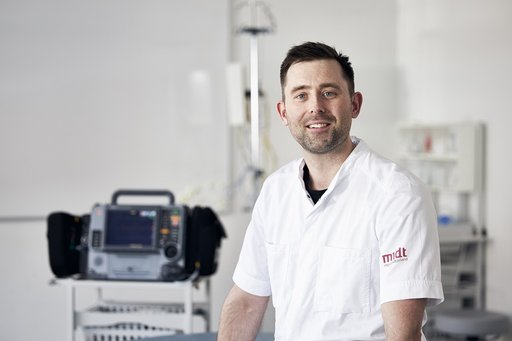Mathias Johan Holmberg

Important knowledge about medicine for patients with cardiac arrest
With his PhD project, Mathias Johan Holmberg has contributed with new insight into the prevalence and treatment of cardiac arrest.
By Filip Graugaard Esmarch
Mathias Holmberg became interested in cardiac arrest in hospitalised patients when, as a medical student, he spent his research year at a hospital linked to Harvard Medical School in Boston. During his research year, he realised that very little knowledge existed about the acute and unexpected condition cardiac arrest, which is a difficult research area due to the high mortality rate.
“No strong evidence exists for many of the treatments we offer at hospitals. However, after graduating as doctor I returned to the hospital in Boston to take a PhD as part of a Danish-American collaboration,” explains Mathias Holmberg.
He started by studying the prevalence of cardiac arrest in hospitals. In the USA, such data are not available in national registers. However, by using sophisticated statical methods, he successfully estimated the number of patients suffering cardiac arrest in American hospitals to be just less than 300,000 patients per year. This number is significantly higher than previously assumed, and his findings are therefore frequently quoted by others.
Means for resuscitation
Mathias Holmberg then went on to study some of the drugs used for resuscitation attempts. 2010 saw atropine removed from the international guidelines for treatment of cardiac arrest. However, no thorough studies have been conducted as to whether its exclusion was warranted.
“We applied some statistical methods that were much more complex than those that had previously been applied. Our study shows that the use of atropine is not linked to higher survival rates , which supports the current recommendations.
“We applied some statistical methods that were much more complex than those that had previously been applied.
In the third study, we collected a vast amount of knowledge about the well-known use of adrenaline. The use of adrenaline has been surrounded by some controversy because it was believed that, although it might be efficient for resuscitation, it also seemed to lead to higher rates of brain damage,” explains Mathias Holmberg.
However, based on his meta-analysis, he is convinced that he can eliminate this concern. The study was commissioned by the international organisation that makes the guidelines in the area. And Mathias Holmberg co-authored the guidelines for both 2019 and 2020.
Prevention and reduction
In his thesis, Mathias Holmberg also presents a study where 48 patients suffering from cardiac arrest were given ubiquinol, which in a previous scientific study had been shown to improve survival rates and reduce the brain damage caused during cardiac arrest.
“The drug can only be administered orally in the form of a liquid. However, in our initial study, it did not seem to be absorbed by the body via that route. The primary purpose of the study was therefore to study it further, and we succeeded in showing that ubiquinol actually can be absorbed via the gastrointestinal tract,” says Mathias Holmberg.
Unfortunately, it did not appear to have the same positive effect as described in the old study.
After completing his PhD, Mathias Holmberg has divided his work between clinical work and research, and he is planning to keep it that way.